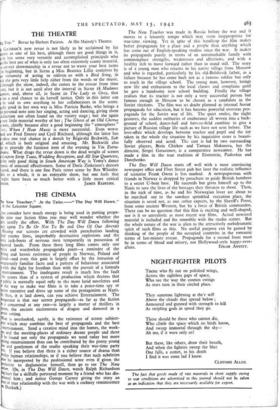THE CINEMA e New Teacher." At the Tatler.-" The Day
Will Dawn." At the Leicester Square.
YOU consider how much energy is being used in putting propa- a into our fiction films you may well wonder whether the s justify the effort. With The Day Will Dawn following y upon To Be Or Not To Be and One Of Our Aircraft Missing our screens are crowded with parachutists landing d enemy lines, improbably destructive explosions and the tic jack-boots of nervous men temporarily in possession of uered lands. From these three long films comes only one .e and worthwhile propaganda point—a reminder of the ing and heroic resistance of people in Norway, Poland and d—and even this gain is largely offset by the intrusion of gruously familiar faces and a pattern of behaviour associated with the fight for freedom than with the pursuit of a formula
entertainment. The inadequate result is much less the fault
the actors than of a system of production which decrees that public is mentally equal only to the more lurid novelettes and the way to make war films is to take a peace-time spy or er narrative and dress up some of the protagonists as Nazis. thus, it is laid down, can you achieve Entertainment. The uence is that our screen propaganda—as far as the fiction is concerned at any rate—is largely a matter of thrillers in
orm, the ancient excitements of dragon and damosel in a em setting.
that is overlooked, surely, is the existence of screen subject- which may combine the best of propaganda and the best entertainment. Send a creative mind into the homes, the work- and the meeting-places of ordinary decent people and there be found not only the propaganda we need today but more g entertainment than can be contributed by the pretty young and gentlemen of the studio speaking their war-time- party
• If you believe that there is a richer source of drama than day human relationships, or if you believe that such subtleties be interpreted by the professional actor even if given the nity to deglamorise himself, then go to see The New ker. (Or, in The Day Will Dawn, watch Ralph Richardson hurt for a skilfully portrayed moment by a friend who has die- ted him ; and notice George Carney giving the story an of true relationship with the war with a cockney reminiscence Dunkirk.)
The New Teacher was made in Russia before the war and it moves to a leisurely tempo which may seem inappropriate for war-time. viewing. Yet in spite of this handicap the film makes better propaganda for a place and a people than anything which has come out of English-speaking studios since the war. It makes its propaganda purely in terms of an unremarkable family with commonplace strengths, weaknesses and affections, and with a healthy itch to move forward rather than to stand still. The story is of a young man who returns to his native village from Moscow and who is regarded, particularly by his old-Bolshevik father, as a failure because he has come back not as a famous soldier but only to teach in the village school. The young man, however, brings new life and enthusiasm to the local classes and complains until he gets a handsome new school building. Finally the village realises that its teacher is not only a very successful person but famous enough in Moscow to be chosen as a candidate in the Soviet elections. The film was no doubt planned as internal Soviet propaganda for education, but it has become powerful overseas pro- paganda for the Soviet way of life. The quiet smiles, the slight gestures, the sudden outbursts of exuberance all woven into a back- ground of school, dance-hall and harvest-field combine to give a picture of Russian village life such as we have not seen before. The love-affair which develops between teacher and pupil and the joy taken in the whole shy situation by his inquisitive sister is beauti- fully observed and acted. Th:: cast is led by two outstanding Soviet players, Boris Chirkov and Tamara Makarova, but the director, Sergei Gerasimov, is a comparative newcomer. He has made a film in the true tradition of Eisenstein, Pudovkin and Dovzhenko.
The Day Will Dawn starts off well with a most convincing newspaper office and Fleet Street pub but later the realistic influence of scenarist Frank Owen is less marked. A newspaperman with friends in Norway is dropped by parachute to guide British bombers to a secret U-boat base. He succeeds but gives himself up to the Nazis to save the lives of the hostages they threaten to shoot. Then, in the nick of time, as he and his Norwegian lover are about to be marched out to the sawdust sprinkled execution place, the situation is saved not, as one rather expects, by the Sheriff's Posse, from some ancient Western, but by a force of British commandos. There can be no question that this film is exciting and well-shaped, nor is it so unrealistic as most recent war films. Actual newsreel material is included and fits smoothly with the studio scenes. But the whole nature of the war is alien to the attractively melodramatic spirit of such films as this. No useful purpose can be gained by thinking of the people of the occupied countries in the romantic terms of last-minute rescue. Propaganda for a second front must be in terms of blood and misery, not Hollywood-style happy-ever-


























 Previous page
Previous page